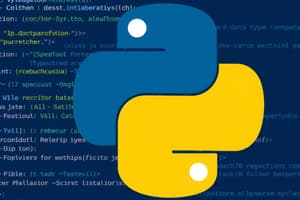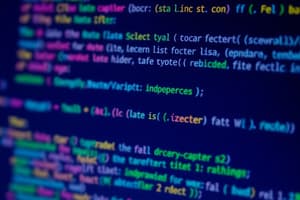Podcast
Questions and Answers
What is the role of an operator in programming?
What is the role of an operator in programming?
- A variable that stores temporary information
- A symbol that represents a function calculating a value (correct)
- A method to modify user input
- A function that executes a program
Which of the following best describes a selection in programming?
Which of the following best describes a selection in programming?
- A mechanism to choose whether code will execute (correct)
- A method of organizing arrays
- A process to determine output conditions
- A structure used to gather user input
How does a counter controlled loop function?
How does a counter controlled loop function?
- It continues until a variable surpasses a specified threshold (correct)
- It loops until a specific input value is detected
- It repeats indefinitely until the user stops it
- It repeats a set number of times based on user input
What is a sentinel controlled loop designed to do?
What is a sentinel controlled loop designed to do?
Which statement is true regarding type casting?
Which statement is true regarding type casting?
Flashcards
Syntax
Syntax
The specific set of rules that dictate how to write a program in a particular programming language.
Operator
Operator
A symbol that represents a specific function, performing calculations or operations on values.
Operand
Operand
The actual value or data that is located to the left or right of an operator in an expression.
Type Casting
Type Casting
Signup and view all the flashcards
Array
Array
Signup and view all the flashcards
Study Notes
Programming Concepts
- Syntax: Refers to the specific set of rules that dictate how to write a program in a particular programming language.
- Operator: A symbol that represents a specific function, performing calculations or operations on values.
- Operand: The actual value or data that is located to the left or right of an operator in an expression.
- Promotion: The process of changing a variable's data type to allow it to hold a larger or more complex data type.
- Demotion: The process of changing a variable's data type to a simpler one, potentially resulting in the loss of data.
- Type Casting: A method to temporarily and explicitly change the data type of a variable for a specific operation or context.
User Interaction
- Input: The data or information that a user provides to the program for processing.
- Output: The results or information generated by the program and sent back to the user.
- Prompt: A message or request made by the program to ask the user for input.
- Relational Operators: A type of operator that performs comparisons and yields TRUE or FALSE as the result.
Control Structures
- Selection: A programming concept that allows the code to execute conditionally based on certain criteria.
- Repetition: A concept where specific code is executed repeatedly until a certain condition is satisfied.
Looping Mechanisms
- Sentinel Controlled Loop: A type of loop that continues to execute until a predetermined specific value (the sentinel) is encountered.
- Counter Controlled Loop: A loop structure that runs until a variable reaches a defined limit or threshold.
Data Structures
- Array: An organized collection of data elements, usually of the same data type, held within a single variable.
- String: A specific type of array where the elements are characters, used to represent text.
- Counters: Specialized variables used in loops to count a specified number of iterations or amounts.
- Accumulators: Variables within a loop that aggregate total values or data as the loop runs, effectively summing or collecting data over time.
Studying That Suits You
Use AI to generate personalized quizzes and flashcards to suit your learning preferences.




